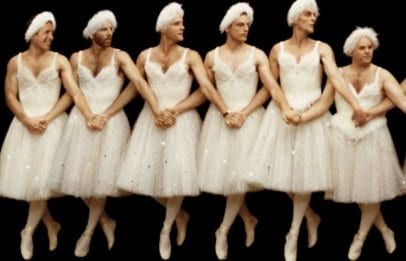There’s never a shortage of great gay and lesbian autobiographies out there (let’s face it, our lives are just more interesting), but it’s rare when a memoir does more than just provide someone’s side of a story or put the final polish on a reputation well-earned. Two new memoirs from the brilliant American writers Terrence McNally and Jim Grimsley aim to fix the world, becoming something greater than the men writing them.

And what they are are fascinatingly diverse. From the working-class love story Frankie and Johnny in the Clair De Lune, to the wildly divisive AIDS drama Love! Valour! Compassion!, to the controversial “gay Jesus” play Corpus Christi, McNally’s plays do more than any set of childhood recollections to reveal a man whose curiosity about the inner workings of the human heart is near-boundless and an artist who believes that theatre can and should change our society.
“I think we go to the theatre to learn how to be better, fuller human beings,” he writes in one of the book’s superb behind-the-scenes essays, “or at least be reminded that we can be.”
Becoming a better, fuller human being is also the basis for the long-awaited book from southern US author Jim Grimsley, author of haunting novels like Dream Boy and My Drowning. His new book is not a complete memoir, but a recollection of his school years in a highly charged place and time: the newly racially-integrated North Carolina of the 1960s. The subtitle of How I Shed My Skin is “Unlearning the Racist Lessons of a Southern Childhood” and it’s easy to see that what should have been a memoir of a lost era is instead disturbingly timely and a vital read.

“. . . I felt a dread of what might happen if I should give anyone evidence of what I was.
But I wondered about the silent system within me that created this fear, the understanding that my caring for another boy would be dangerous if I carried my longing from wish to action. How much did it share with that other quiet set of rules, the ones that had taught me I was white and must separate myself from darkness? In coming to know black people for myself, outside what I was expected to see, how much did I learn about myself?
When the revolution came, would it also free me?”
At one point, Grimsley is handed an unexpected beard when rumors fly about him spending time with a girl named Ursula (“There was comedy in the fact that the people who called me sissy behind my back also condemned me for interracial (and heterosexual) dating”) while he ends up taking a white girl named Mercy to prom as cover so she can be with her secret black boyfriend. Straight or gay, Grimsley learns, the world is cruel to young love.
The book ends with the chapter “Reunion,” where Grimsley attends the 40-year reunion of the class of ’73 and examines how his friends have grown so much, yet America so little.
“Somewhere in my memory,” he writes, “beneath all I’ve learned and experienced, there is still the little bigot I was meant to be . . . What we learn in those earliest months and years can never be deleted. But this fact was never a doom or a destiny. I changed. I learned to question the programming.”
As McNally writes in his book, “A good liar can write a good memoir . . . A great liar will write an even better one,” but it’s the writers who tell the hardest of truths that create the best of memoirs.


 Why you can trust Xtra
Why you can trust Xtra


